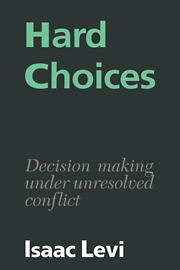Book contents
- Frontmatter
- Contents
- Preface
- 1 MORAL STRUGGLE
- 2 DILEMMAS
- 3 VALUES IN SCIENTIFIC INQUIRY
- 4 CHOICE AND FOREKNOWLEDGE
- 5 VALUE STRUCTURES
- 6 VALUES REVEALED BY CHOICES
- 7 UNCERTAINTY AS A SOURCE OF CONFLICT
- 8 CONFLICT AND SOCIAL AGENCY
- 9 DISTRIBUTING BENEFITS
- 10 UTILITARIANISM AND CONFLICT
- 11 SOCIAL CHOICE THEORY
- 12 CONFLICT AND INQUIRY
- Notes
- Bibiliography
- Name index
- Subject index
8 - CONFLICT AND SOCIAL AGENCY
Published online by Cambridge University Press: 05 June 2012
- Frontmatter
- Contents
- Preface
- 1 MORAL STRUGGLE
- 2 DILEMMAS
- 3 VALUES IN SCIENTIFIC INQUIRY
- 4 CHOICE AND FOREKNOWLEDGE
- 5 VALUE STRUCTURES
- 6 VALUES REVEALED BY CHOICES
- 7 UNCERTAINTY AS A SOURCE OF CONFLICT
- 8 CONFLICT AND SOCIAL AGENCY
- 9 DISTRIBUTING BENEFITS
- 10 UTILITARIANISM AND CONFLICT
- 11 SOCIAL CHOICE THEORY
- 12 CONFLICT AND INQUIRY
- Notes
- Bibiliography
- Name index
- Subject index
Summary
What is an agent?
I have been arguing that decision making under unresolved conflict not only is coherent but, on some occasions, may be the rationally sensible response. Some may be prepared to concede the point when it comes to institutions or social groups. These are not, so it may be claimed, agents properly speaking and, hence, should not be expected to meet the standards of rationality personal agents should satisfy. Before turning to the role of unresolved conflict in social choice theory, we shall devote some attention to this question.
Formal analogies between criteria for rational decision making by individuals and rational group or social decision making have been evident to some authors ever since Plato exploited analogies between the organization of the soul and the state in The Republic while expounding his conception of justice. Nonetheless, there is a widespread reluctance to acknowledge the existence of groups and institutions as agents. This leads to some bizarre juxtapositions.
Thus, neoclassical economists are not noted for their sympathy with notions of group mind. Yet in expounding the theory of consumer demand, they often allow families to qualify as consumers. Ideally, at least, such consumers are taken to be maximizers of their preferences or valuations subject to budgetary constraints. Given the indifference maps representing the consumer's preferences and given the budgetary constraints, demand curves are derived. Such analysis applies to any consumer, including families and firms, and is not restricted to persons.
- Type
- Chapter
- Information
- Hard ChoicesDecision Making under Unresolved Conflict, pp. 149 - 157Publisher: Cambridge University PressPrint publication year: 1986



